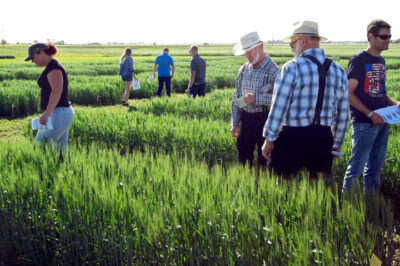Farming Smarter back in the field
By Tim Kalinowski on July 23, 2021.
 Herald photo by Tim Kalinowski -
Farming Smarter Plot Hop participants look over the results of "perfect placement" durum sowed by a seed planter to see if using the unorthodox machine could improve yield growth on Thursday at the Lethbridge Research Station fields.
Herald photo by Tim Kalinowski -
Farming Smarter Plot Hop participants look over the results of "perfect placement" durum sowed by a seed planter to see if using the unorthodox machine could improve yield growth on Thursday at the Lethbridge Research Station fields.LETHBRIDGE HERALDtkalinowski@lethbridgeherald.com
Farming Smarter held its first in person Plot Hop in over a year at its compound on Thursday. The event, which has participants being driven around in a wagon to various test plots to learn about the results of Farming Smarter’s extension research projects geared toward helping solve problems encountered in everyday management of their fields, is usually an opportunity to learn and socialize with various members of the regional research, agronomy and agriculture community.
Farming Smarter general manager Ken Coles showcased just such a farmer-led research project as the first presentation of the morning on Thursday. Coles had the project built as a direct result of a question asked by members of the local Hutterite community about how they could improve durum yields, which have not seen as many gains in the agriculture industry at large with fewer research dollars dedicated to it than other crops grown under irrigation.
Farming Smarter took up the challenge, said Coles, and decided to take the unusual step of experimenting with a seed planter, usually used for crops with larger seeds like corn, to see if more precise control of row spacing during the seeding process could do the trick. They also experimented with various fertilizer rates, fungicide rates and growth regulators, Coles confirmed in the various micro-plots to compare results.
Seed planters are generally a lot slower and more ponderous machines to use in general agriculture compared to air seeders, but that’s why Farming Smarter exists, said Coles, to try “crazy ideas” farmers themselves don’t always have time to try in their own operations.
“If we haven’t improved our yields in a lot of years, sometimes it’s worth trying something a little crazy,” explained Coles. “That’s what we like to do: try something new, try something different, see if there is an advantage, and try to study it enough to know whether it’s true or not.
“As we are competing globally,” he added later, “farmers always need to find ways to either get higher yields or reduce costs. And they do that to be competitive, to be able to be profitable. So as a general strategy, agronomy is the study of energy efficiency in crop production. So if it has a benefit to the entire society as far as growing more with less, essentially. That is always a goal a farmer has.”
Coles said over the course of the three-year plot study on “perfectly placed” durum seed, Farming Smarter has seen a five bushel gain advantage over plots planted using an air seeder. Not a huge gain, acknowledged Coles, but significant nonetheless.
“What I am excited about with the planter is it spaces things out perfectly,” he said. “One of the reasons we thought that might be a benefit in things like irrigated durum is because you have perfect placement of that seed that is probably going to affect how that crop tillers (grows out). That your plant competition matters.
“If you see a double-seeded row, for whatever reason, that inter-plant competition will increase the height,” stated Coles.
Follow @TimKalHerald on Twitter
4-3




